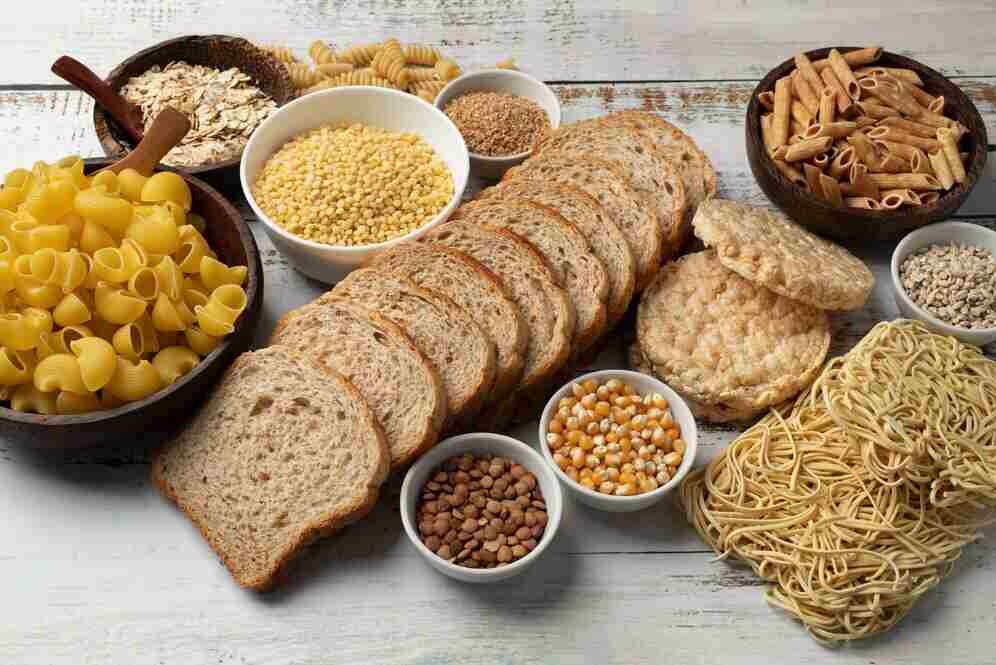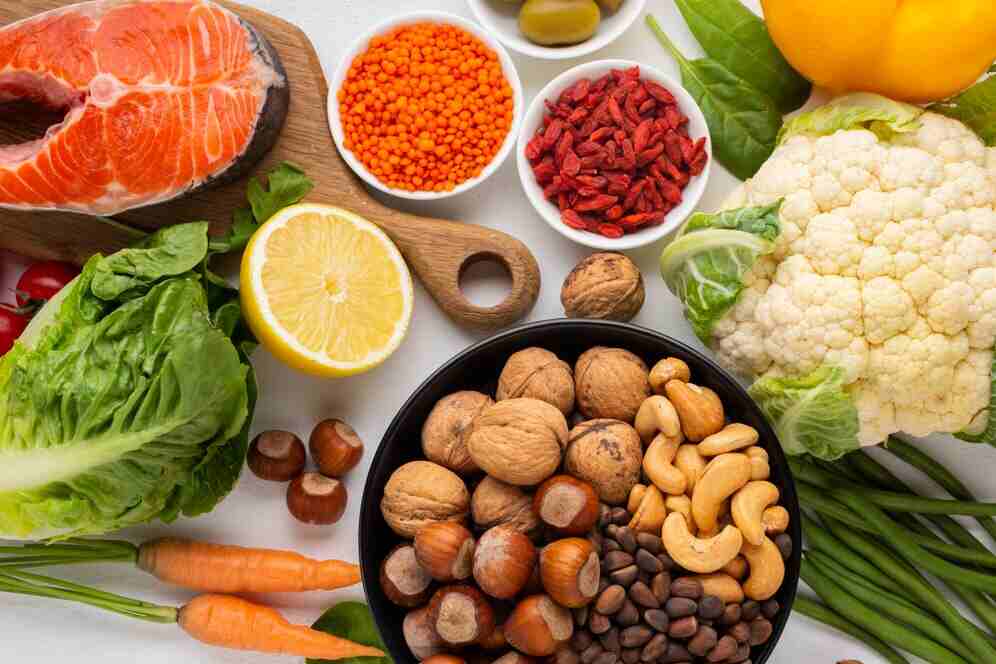Managing blood sugar levels is essential for overall health, especially for individuals with diabetes or prediabetes. Diet plays a crucial role in regulating glucose levels, as certain foods can help stabilize blood sugar while others cause sudden spikes.
Many people worry about how different foods impact glucose metabolism and insulin sensitivity. However, research shows that low-glycemic, fiber-rich, and nutrient-dense foods can support steady blood sugar control. Incorporating the right foods into your diet can help prevent spikes and crashes, reducing the risk of complications.
In this article, we’ll explore the best foods that lower blood sugar levels naturally, including their benefits and how they work in the body. Whether you’re managing diabetes or simply looking for natural ways to lower blood sugar, these dietary choices can help you maintain better health.
The Science Behind Blood Sugar Regulation
Blood sugar regulation is primarily controlled by insulin, a hormone produced by the pancreas. When you eat, carbohydrates break down into glucose, which enters the bloodstream. In response, insulin helps transport glucose into cells for energy. However, in people with insulin resistance or diabetes, this process is impaired, leading to elevated blood sugar levels.
How Diet Impacts Blood Sugar
Certain foods can help regulate blood sugar by influencing glucose metabolism and insulin sensitivity:
- Fiber slows digestion and glucose absorption, preventing sudden spikes. Foods like leafy greens, legumes, and whole grains are excellent choices.
- Protein supports insulin function and provides sustained energy without raising blood sugar. Lean proteins like eggs, fish, and Greek yogurt are beneficial.
- Healthy fats, such as those in avocados, nuts, and olive oil, help reduce inflammation and insulin resistance.
- Low-glycemic index (GI) foods digest slowly, preventing glucose surges. Examples include berries, quinoa, and beans.
Scientific Insights
Studies suggest that a fiber-rich diet improves blood sugar control, while omega-3 fatty acids from fish enhance insulin sensitivity. Additionally, spices like cinnamon and turmeric have been shown to lower fasting blood sugar levels. By choosing the right foods, you can naturally stabilize glucose levels and support long-term metabolic health.
Best Foods That Lower Blood Sugar Levels
Managing blood sugar levels naturally starts with choosing the right foods. Certain nutrient-dense foods help regulate glucose by slowing sugar absorption, enhancing insulin sensitivity, and reducing inflammation. Here’s a list of the best foods to incorporate into a blood sugar-friendly diet:
1. Fiber-Rich Foods (Slow Sugar Absorption & Digestion)
Fiber plays a crucial role in slowing digestion, preventing rapid glucose spikes, and promoting gut health.
- Leafy Greens (Spinach, Kale, Swiss Chard) – These are low-GI, rich in fiber, and packed with magnesium, which supports insulin sensitivity.
- Legumes (Lentils, Chickpeas, Beans) – High in fiber and plant-based protein, legumes slow glucose absorption and stabilize blood sugar.
- Whole Grains (Quinoa, Oats, Brown Rice) – Unlike refined grains, whole grains have a lower glycemic impact and provide sustained energy.
2. High-Protein Foods (Enhance Insulin Sensitivity & Satiety)
Protein doesn’t spike blood sugar and helps improve insulin function.
- Eggs – Studies suggest eggs improve insulin response and keep you full longer.
- Fatty Fish (Salmon, Tuna, Sardines) – Rich in omega-3 fatty acids, which reduce inflammation and enhance insulin function.
- Greek Yogurt – A low-GI dairy option packed with probiotics that support metabolism and blood sugar balance.
3. Healthy Fats (Slow Sugar Absorption & Reduce Inflammation)
Healthy fats support stable blood sugar levels by reducing insulin resistance and inflammation.
- Avocados – Low in carbs, high in monounsaturated fats, and support heart health.
- Nuts & Seeds (Almonds, Chia Seeds, Flaxseeds) – Provide a balance of fiber, protein, and healthy fats, helping with glucose stability.
- Olive Oil – Contains anti-inflammatory properties that support insulin sensitivity.
4. Low-Glycemic Fruits (Best Choices for Blood Sugar Control)
Not all fruits cause sugar spikes. These low-GI, fiber-rich fruits are excellent for diabetes management.
- Berries (Strawberries, Blueberries, Raspberries) – Low in sugar, high in antioxidants and fiber.
- Apples & Pears – Contain soluble fiber that helps slow glucose absorption.
- Citrus Fruits (Oranges, Grapefruit, Lemons) – Provide vitamin C and compounds that enhance insulin function.
5. Blood Sugar-Lowering Spices & Drinks
Some spices and beverages have been linked to better blood sugar control.
- Cinnamon – Studies show it can lower fasting blood sugar and improve insulin sensitivity.
- Turmeric (Curcumin) – An anti-inflammatory spice that helps regulate blood glucose levels.
- Green Tea – Rich in antioxidants that support glucose metabolism and reduce oxidative stress.
How These Foods Help Control Blood Sugar
The foods listed above play a crucial role in blood sugar regulation through their effects on digestion, metabolism, and insulin function. Here’s how they work:
1. Fiber’s Role in Slowing Sugar Absorption
Fiber is essential for slowing the absorption of glucose into the bloodstream, preventing sharp spikes in blood sugar.
- Soluble fiber, found in oats, legumes, apples, and pears, forms a gel-like substance in the gut, delaying digestion and stabilizing blood sugar levels.
- Insoluble fiber, found in leafy greens and whole grains, promotes healthy digestion and reduces glucose fluctuations.
2. Protein & Insulin Sensitivity
Protein-rich foods help regulate blood sugar by slowing digestion and preventing glucose surges after meals.
- Eggs, Greek yogurt, and fatty fish help promote fullness and satiety, reducing overall carbohydrate intake.
- Studies show that protein increases insulin sensitivity, helping cells absorb glucose more efficiently.
3. Healthy Fats for Blood Sugar Control
Healthy fats, particularly monounsaturated fats (MUFAs) and omega-3 fatty acids, help reduce insulin resistance and inflammation.
- Avocados, nuts, seeds, and olive oil improve insulin sensitivity and slow sugar absorption.
- Fatty fish (salmon, tuna, sardines) provide omega-3s, which reduce inflammation and enhance glucose metabolism.
4. Antioxidants & Anti-Inflammatory Properties
Chronic inflammation is linked to insulin resistance and poor glucose control. Certain foods contain antioxidants and bioactive compounds that help combat this:
- Berries are rich in polyphenols, which improve insulin response.
- Turmeric (curcumin) has been shown to lower blood sugar and fight inflammation.
- Green tea contains catechins, which support glucose metabolism and reduce oxidative stress.
By incorporating these blood sugar-friendly foods, you can naturally regulate glucose levels, improve insulin sensitivity, and promote long-term metabolic health.
Foods to Avoid for Stable Blood Sugar
While certain foods help regulate blood sugar, others can cause rapid spikes and worsen insulin resistance. Here are some of the top offenders:

1. Refined Carbs (White Bread, Pastries, White Rice)
Refined carbohydrates have been stripped of fiber and essential nutrients, leading to quick digestion and rapid glucose absorption.
- White bread, pasta, pastries, and white rice rank high on the glycemic index (GI) and can cause blood sugar spikes.
- Opt for whole grains like quinoa, brown rice, and whole wheat bread for better blood sugar control.
2. Sugary Drinks (Soda, Energy Drinks, Fruit Juices)
Beverages loaded with added sugars contribute to insulin resistance and metabolic disorders.
- Sodas, sports drinks, and fruit juices lack fiber, leading to quick sugar absorption and energy crashes.
- Choose water, unsweetened herbal teas, or infused water instead.
3. Trans Fats & Processed Snacks (Chips, Fried Foods)
Trans fats and processed foods contribute to inflammation, insulin resistance, and obesity.
- Fried foods, packaged snacks, and processed meats often contain unhealthy fats that worsen metabolic health.
- Opt for healthy fats like avocados, nuts, and olive oil to support stable blood sugar levels.
By avoiding these high-GI and processed foods, you can improve insulin sensitivity, prevent sugar spikes, and support long-term metabolic health.
Additional Lifestyle Tips for Blood Sugar Control
Along with a healthy diet, lifestyle habits play a crucial role in maintaining stable blood sugar levels. Here are some key practices to follow:
1. Regular Physical Activity
Exercise helps the body use glucose more efficiently by improving insulin sensitivity.
- Aerobic exercises like walking, cycling, and swimming help lower blood sugar levels.
- Strength training builds muscle, which can enhance glucose metabolism.
- Even simple activities like taking short walks after meals can prevent blood sugar spikes.
2. Portion Control
Eating balanced meals in controlled portions prevents overconsumption of carbs, which can lead to glucose imbalances.
- Use the plate method: Fill half with non-starchy vegetables, a quarter with lean protein, and a quarter with whole grains or healthy carbs.
- Avoid overeating, and opt for smaller, more frequent meals to prevent blood sugar fluctuations.
3. Hydration & Sleep
Proper hydration and sleep are essential for metabolic health.
- Drinking enough water helps the kidneys flush out excess glucose.
- Quality sleep supports hormonal balance and reduces insulin resistance.
- Lack of sleep can increase cravings for sugary foods and disrupt glucose control.
By combining healthy eating with lifestyle modifications, you can effectively manage blood sugar and improve overall health.
FAQs:
What are the best foods to lower blood sugar quickly?
Foods rich in fiber, protein, and healthy fats can help stabilize blood sugar. Some top choices include:
- Leafy greens (spinach, kale) – Low in carbs and high in magnesium, which helps insulin function.
- Berries – High in fiber and antioxidants, slowing sugar absorption.
- Cinnamon – Can help lower fasting blood sugar levels.
- Apple cider vinegar – May improve insulin sensitivity when consumed before meals.
Can drinking green tea help lower blood sugar?
Yes! Green tea contains antioxidants like catechins, which may improve insulin sensitivity and reduce blood sugar levels. Unsweetened green tea is the best option for those managing diabetes.
Are carbs bad for diabetics?
Not all carbs are bad! Refined carbs (white bread, pastries, sugary snacks) can cause blood sugar spikes, while complex carbs (quinoa, whole grains, legumes) digest slowly and provide steady energy. Pairing carbs with protein and fiber helps prevent glucose spikes.
What foods help prevent blood sugar spikes?
To avoid blood sugar spikes, focus on low-glycemic, fiber-rich, and protein-packed foods:
- Avocados & nuts – Healthy fats slow sugar absorption.
- Legumes (chickpeas, lentils, beans) – High fiber content helps regulate glucose.
- Whole grains (brown rice, quinoa, oats) – Better than refined grains for blood sugar stability.
By making smart food choices and balancing meals, you can support stable blood sugar and overall health.
Conclusion
Maintaining stable blood sugar levels is essential for overall health, especially for those managing diabetes. Incorporating fiber-rich foods like leafy greens and whole grains, protein sources such as eggs and fatty fish, and healthy fats like avocados and nuts can help regulate glucose levels effectively. Additionally, low-glycemic fruits, green tea, and blood sugar-friendly spices support insulin sensitivity and metabolic health.
Beyond diet, portion control, regular exercise, and proper hydration play key roles in long-term blood sugar management. By making consistent, healthy food choices, you can naturally support balanced glucose levels and overall well-being.
